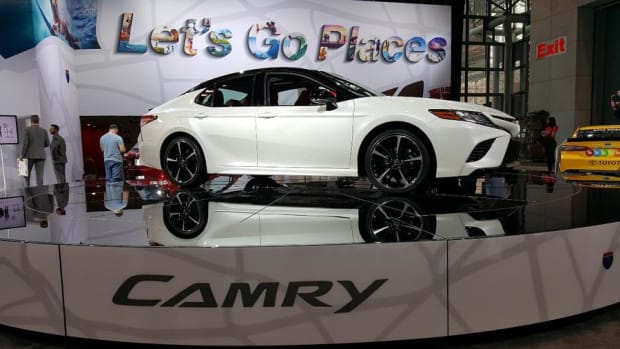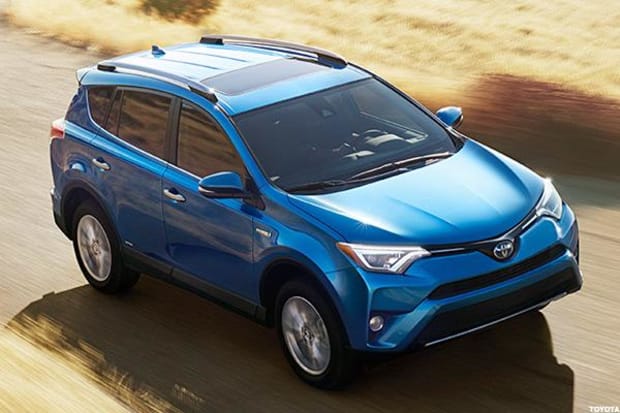What if the big winner of the difficulties that the automotive industry is currently going through was Toyota (TM)?
The Japanese vehicle manufacturer seems to be off the radar. This position seems to suit the company. It's as if the manufacturer of Corolla and Camry sedans likes the spotlight to be shone on its main rivals and meanwhile the group focuses on its activities.
Since the beginning of the year, attention has been on Tesla (TSLA), Ford (F), GM (GM), Volkswagen (VWAGY) and also on new players such as Rivian (RIVN), Lucid (LCID), Nikola (NKLA). Their announcements in electric vehicles punctuate the daily life of the automotive industry. We almost forgot that in 2021, Toyota ended the domination of the American automobile market by GM.
After 90 years of unchallenged domination, General Motors handed over its crown as the leading manufacturer of cars in the United States. The Detroit automaker has been the largest seller of vehicles in the country since 1931, when it surpassed Ford.
Toyota Motor sold 2.3 million vehicles in the United States in 2021, up 10.4% from 2020, compared with 2.2 million for GM, down 13%.
Critics of the Japanese automaker and supporters of the Detroit group had pointed out that it was only temporary.

Toyota Sells More Cars in The U.S. Than GM
However, three months later, Toyota has just repeated the feat.
The automaker sold 514,592 vehicles in the first quarter of 2022 on American soil. This number is however down 14.7% compared to the same period in 2021 but it is good enough to keep GM at bay. GM only sold 512,846 cars, down 20 percent, in the U.S. during the first three months of the year, according to a press release.
As often, the Japanese automaker did not take a victory lap.
"We thank our loyal customers for their continued trust in the Toyota and Lexus brands and their patience as we work around the clock to ensure their needs are satisfied," said Jack Hollis, senior vice president, automotive operations. "As we work through the ever-changing market dynamics, our customers can depend on our diverse lineup of sedans, trucks, utilities and electrified vehicles for their lifestyle."
GM attributes its second place to the shortage of parts needed to assemble certain models and to disruptions in supply chains. But to be clear, Toyota is facing the same problems. However, the Japanese group seems to manage its stock better, which allows it to limit the negative impact.
“Supply chain disruptions are not fully behind us, but we expect to continue outperforming 2021 production levels, especially in the second half of the year," said Steve Carlisle, executive vice president and president, GM North America.

Hybrid Cars Versus EV
It wouldn't be surprising if Toyota cemented its title as the biggest U.S. vehicle seller in the second quarter because the same factors that held GM back still seem to be in place and have even gotten worse.
General Motors will cancel production during the week of April 4 at Lansing Grand River assembly, where it builds the Cadillac CT4, Cadillac CT5 and Chevrolet Camaro, because of a temporary part shortage.
The company is also going to halt production for a few weeks at an assembly plant in Fort Wayne, Ind., that builds the Chevrolet Silverado 1500 and GMC Sierra 1500 pickup trucks over the semiconductor chip shortage.
The prices of raw materials such as nickel, palladium and aluminum remain very high, which complicates their supply because there is an imbalance between supply and demand. The three elements help make catalytic converters, air conditioner condensers and other essential car parts.
"GM expects inventory to remain relatively low throughout the year due to high demand," the company warned on Friday.
But, Toyota also sees its bet on hybrid vehicles paying off, while GM has chosen all-electric.
Sales of Toyota's hybrid gas-electric vehicles, which now represent more than a quarter of the group's sales, were down only 3.9 percent at 132,938 units in the first quarter, as consumers, faced with soaring gasoline and diesel prices, look to alternatives.
Conversely, GM only delivered 457 electric vehicles during the first quarter, despite a full order book. Sales are split between the GMC Hummer electric pickup (99 units) and the Chevy Bolt EV/Bolt EUV (358 units.)
These low numbers are due to GM suspending production of the Chevy Bolt EV/SUV Bolt EUV for several months. Production should resume on April 4.







